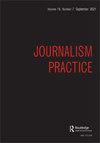“我们是中间者”:媒体组织中跨界受众导向专业人士的专业知识交流
IF 2
2区 文学
Q2 COMMUNICATION
引用次数: 0
摘要
摘要随着新闻业的受众转向被积极接受,媒体机构越来越多地聘用面向受众的专家。通过对在美国46家新闻机构工作的57名面向受众的专业人士的采访,本研究将面向受众的角色定位为跨界专家,旨在了解他们如何通过工作角色和惯例将参与概念化,并在组织内传达其专业知识的价值。研究结果表明,这些人面临着将他们的专业知识传达给新闻工作中的各种行动者的挑战,特别是在面对适应新闻权威和制度规范的悖论时。这些专家面临着结构性挑战,包括新闻机构对参与专家的持续缺乏理解和接受,尽管越来越强调受众参与。媒体组织在内部抵制这些被提名的边界跨越者的专业知识,因为它们被束缚在新闻生产和推广的传统制度模式中。关键词:新闻业;受众参与;专家界限;角色概念;角色表现披露声明作者未报告潜在的利益冲突。本文章由计算机程序翻译,如有差异,请以英文原文为准。
“We are the In-betweeners”: Communicating the Expertise of Boundary Spanning Audience-Oriented Professionals in Media Organizations
ABSTRACTWith the audience turn in journalism being actively embraced, media organizations are increasingly hiring audience-oriented experts. Drawing on interviews with 57 audience-oriented professionals working in 46 U.S. news organizations, this study situates audience-oriented roles as boundary spanning experts and aims to understand how they conceptualize engagement through job roles and routines and communicate the value of their expertise within the organization. The findings suggest that these individuals are faced with challenges of communicating their expertise to the various actors in news work, especially when faced with a paradox of adaptability to journalistic authority and institutional norms. These experts face structural challenges including continuous lack of understanding and acceptance of engagement experts within news organizations, despite the growing emphasis placed on audience engagement. Media organizations are internally resisting the expertise of these nominated boundary spanners by being bound to traditional institutional models of news production and promotion.KEYWORDS: Journalismaudience engagementboundary spanningexpertiserole conceptionrole performance Disclosure StatementNo potential conflict of interest was reported by the author(s).
求助全文
通过发布文献求助,成功后即可免费获取论文全文。
去求助
来源期刊

Journalism Practice
COMMUNICATION-
CiteScore
5.50
自引率
14.30%
发文量
111
期刊介绍:
ournalism Practice provides opportunities for reflective, critical and research-based studies focused on the professional practice of journalism. The emphasis on journalism practice does not imply any false or intellectually disabling disconnect between theory and practice, but simply an assertion that Journalism Practice’s primary concern is to analyse and explore issues of practice and professional relevance. Journalism Practice is an intellectually rigorous journal with all contributions being refereed anonymously by acknowledged international experts in the field. An intellectually lively, but professionally experienced, Editorial Board with a wide-ranging experience of journalism practice advises and supports the Editor. Journalism Practice is devoted to: the study and analysis of significant issues arising from journalism as a field of professional practice; relevant developments in journalism training and education, as well as the construction of a reflective curriculum for journalism; analysis of journalism practice across the distinctive but converging media platforms of magazines, newspapers, online, radio and television; and the provision of a public space for practice-led, scholarly contributions from journalists as well as academics. Journalism Practice’s ambitious scope includes: the history of journalism practice; the professional practice of journalism; journalism training and education; journalism practice and new technology; journalism practice and ethics; and journalism practice and policy.
 求助内容:
求助内容: 应助结果提醒方式:
应助结果提醒方式:


